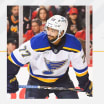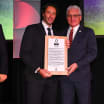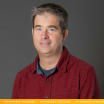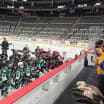Kris Letang, dressed in workout gear and sporting a backward hat and facial hair, walked out of the Penguins locker room in Scotiabank Arena, turned his head and immediately smiled.
Letang's smile was met in kind by a greying and dignified Paul Coffey, standing tall 10-feet away in a smooth, button-down shirt.
The two embraced, a connecting of two generations of elite Penguins defensemen. The former star and the current star. The teacher and the student. The legend and the protégé.
The legend and the protégé
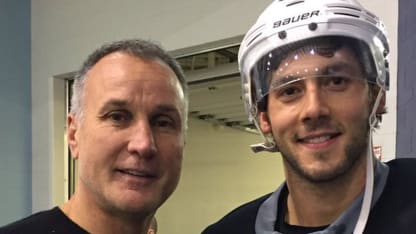
The first order of business was Coffey congratulating Letang on a career achievement.
Two weeks prior Letang recorded an assist on the lone Penguins' goal in a 5-1 loss to Montreal. What made the assist significant was that it was the 441st point in Letang's career, which allowed him to surpass Coffey as the Penguins' all-time leading scorer among defensemen.
"Records are made to be broken," Coffey said. "I couldn't be any prouder to have a guy like Kris take my record over. To accumulate the amount of points and goals that he did is a sign of consistency and a sign of being a great player."
Coffey, 57, needed only five seasons and 331 games to top the list at 440 points. That mark would stand for 26 years - coincidently the age difference between the two men. The fact that Letang needed over double the games - 684 - to break the record wasn't lost upon him.
"The mark he did in three years?" Letang said with a grin. "Just to have my name next to Paul is crazy. It's surreal. I remember being a kid trying to play hockey and get to the NHL. Now to have my name next to his, it's crazy."
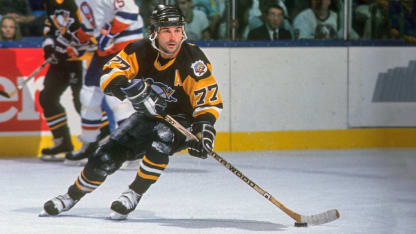
Kristopher Allen Letang was born on April 24, 1987 in Montreal, Quebec. Exactly seven months later, Nov. 24, the Penguins acquired three-time Stanley Cup champion defenseman Paul Coffey from the Edmonton Oilers dynasty.
Coffey would play five seasons with the Penguins and help the franchise win its first-ever Cup in 1991. Coffey played nine more seasons in the league, retiring in 2001 with a decorated career as a four-time champion, a three-time defenseman of the year and three-time Canada Cup champion. He was inducted into the Hockey Hall of Fame in 2004.
Three years later, Coffey returned to Pittsburgh to be inducted into the team's Ring of Honor at Mellon Arena. While watching a game from high above in the press box, a certain player caught his eye.
"I was with Bob Errey watching the game. I still remember the second period the puck right at your net," Coffey recalled to Letang. "You picked the puck up, made a great play and competed. I said 'who's that 58?' (Errey) said, 'That's Kris Letang.' I said, 'that's a good player.'"
Some years later, Coffey was attending a Penguins' game as a guest in Mario Lemieux's suite. Letang was injured at the time and wanted to meet one of his boyhood idols.
"I took a picture with him because I was so excited," Letang said.
Coffey also collected a picture. Though he had different reasons for it at the time.
"I had to find him because my wife had a crush on him," Coffey laughed. "Every time I went to Pittsburgh she said 'get a picture with Letang.'"
But even at that first meeting, Coffey knew right away that the two would form a lasting bond.
"I've got a ton of respect for him. Met him over the years a lot. Had some real good conversations," Coffey said. "The most important thing for me, I loved the game and I loved the guys that played before me. And I respect the guys that played before me. I found that with Kris."
Since that day Letang has sought out the opinion of Coffey throughout the course of his career. And Coffey has obliged at every request.
"I've met tons of players throughout (my career)," said Letang, a 12-year veteran of the league. "But to have an idol of mine, everything he says I keep it and try to execute it and bring it with me. It's all things I can learn.
"That he has the time to talk to me, give me different tips, it just shows how much of a great person Paul is. He was a great player, but an even better person."
During the 2015-16 season - a year that would end with the Penguins winning their first of back-to-back Stanley Cups - Coffey was once again in town. Following a game, Coffey sat in the office of then assistant coach Rick Tocchet when Letang entered the room.
Letang and Tocchet had an animated discussion about the power play while Coffey sat back and observed the coach-player dynamic in action. After some back-and-forth, Tocchet turned to Coffey and asked, "Paul, what do you think?"
Coffey understood the dilemma and delivered his own thoughts.
"I played with two of the greatest players of all time in Wayne (Gretzky) and Mario (Lemieux). I was mentioning to Kris that you've got (Evgeni Malkin) and (Sidney Crosby), two unbelievably great players in their own right," Coffey said. "They can be easy to play with or hard to play with. But when you're on top on the power play and you're the general, so to speak, you've got to be in control.
"I said, what I see is you're getting the puck and then you're having to get it back to Sid or get it back to Geno. The puck probably came from them to start with. So I said, not to overstep my bounds, you have to take more of a leadership role back there and get that puck to the net. If the puck comes from Sid and you take a shot, (Phil) Kessel puts in the rebound, everybody is happy. Be a leader on top."
Coffey recounted this piece of advice to Letang the morning that the Penguins would play the Toronto Maple Leafs. Coincidentally, or not, of all the star power in the lineup that evening on both sides it was Letang who registered a game-high six shots. Letang's final shot would also be his 100th career NHL goal, a milestone that only one other defenseman in Pens history had accomplished - Coffey.
Letang finished with 10 attempted shots as well, and was clearly making a concerted effort to put the puck on the net. Perhaps it was the friendly reminder in the morning that inspired his performance.
"It's fun for a guy like me to get a different opinion, different eyes, a guy with that much experience to tell me different things," Letang said. "Sometimes you question yourself and aren't playing the way you want. He talks to you. He gets you on the right path. It's fun to have a Hall of Famer look out for you."

Paul Coffey's son, Blake, is attending Hobart and William Smith Colleges in upstate New York. Coffey's progeny also plays hockey for his collegiate team, and chose his father's position of defense. But when it came time to select a jersey number…
"He picked 58," Coffey laughed.
In some sense it is only fitting. The dynamic between Coffey and Letang is that of the father-son relationship, Coffey offering fatherly advice and basking in the success of the younger Letang.
And the similarities between the two men are remarkable. Both are offensive defensemen that are highly skilled, can make plays and blessed with speed and skating prowess.
Both players would have a profound impact on the Penguins organization. Each arrived with the team in the midst of consecutive years of missing the playoffs and helped lead the team, along with a talented and worldly cast of teammates, to Stanley Cup championships.
"Our styles, our play, the guys we've played with are somewhat parallel," Coffey said. "A guy like Kris can play in any era because he can skate. I could play in any era because I could skate."
"There's nobody that skates like him," Letang humbly noted. "Obviously, Paul was an idol of mine. Watching him skate was the ultimate thing."
Coffey's skating was arguably his biggest strength. In the mold of Bobby Orr, Coffey could glide effortlessly on the ice, and doing so in skates that were three sizes too small for his feet.
But the defensive position began to evolve as Coffey's career entered the twilight in the end of the 90s. Teams opted away from the quick skating blueliners and stockpiled the big, lumbering, strong defensemen.
It wasn't until the NHL began enforcing obstruction rules following the 2004-05 lockout that the position began to evolve (or devolve) back into more of a skilled and skating style. The tide began to turn in the 2005 NHL Draft, the same year Letang was hoping to hear his named called at the podium.
"Going into the lockout the D that were getting drafted in the first round were all 6-4, 6-3, big guys," Letang said. "Gradually in the draft they took chances in the bottom of the first on a few skill guys. After that you saw smaller D and faster guys. Year after year they started taking smaller guys and speed guys."
The progression of the game has led to faster and faster players being developed and drafted. The big, lumbering defensemen are going extinct.
The culmination of this shift was at the 2018 NHL Draft, which featured nine defensemen drafted in the first round, and 16 in the first two rounds, that were 6-foot or smaller, but skilled and fast.
A skilled skating defenseman was unique in Coffey's era. Now, skating is essentially to play the position.
"You really have to skate. The guys can all skate now," Coffey said. "It's incredible.
"To me, and it's not because we play that position, but it is the hardest position. I think the way the game is now it's harder on a defenseman. There's no help anymore. You can't even tough a guy in front of your own net. You'll get a penalty. You can't kick a guy's laces to get him off balance; you'll get a penalty. It's still a tough position to play."
Coffey helped revolutionize the defensive position. And Letang was part of a wave that returned the position to its glory days. It seems as though defensemen have come full circle. Though the style may change over the years, hockey remains a simple game.
"Hockey is always the same game," Letang said. "Mentality is the main thing we talk about. I know my strengths. I'm going to use my skating. I'm going to make plays.
"The mental aspect is the main thing. I think it plays a big role in hockey."

It was timing and fate that brought Coffey and Letang together on this mid-October day. The Pens happened to be in Coffey's hometown of Toronto a mere two weeks after Letang passed him in the franchise's record books.
While his teammates were on the ice for an optional morning skate, Letang sat in a lounge chair with Coffey at his side. The two greatest defensemen in Penguins history spent 40 minutes that afternoon talking hockey, history and more on The Scoop podcast.
Eventually the topic turned to Letang skipping that day's morning skate.
"You won't be breaking records if you're taking days off," Coffey joked.
"I didn't take a day off," Letang retorted. "I have a game tonight."
After the session wrapped, Letang and Coffey stayed for an additional 30 minutes to chat. Every time the conversation started to dwindle, one of them would start a new topic. It was as if they didn't want that moment to end.
Before parting company, Coffey and Letang posed for a photo together - just as they had during the first time they met. Letang posted the photo on his Instagram account with the caption: "The #legend and the protégé."
Two players that have left their mark on the Penguins organization forever. One retired, the other paying his respects while continuing to make his mark on the league.
"(Letang has) got lots of runway left, great player, plays hard, works hard. He'll do a lot more great things for Penguins fans," Coffey said.
But Letang's runway will run out at some point. Every player's career comes to an end eventually.
Perhaps 30 years down the road Letang will find himself on the other side, playing the role of the elder statesman to the next generation, sharing his experience, advice and love of the game. Handing down his legacy to the next defensive great, just as Coffey had done for him.
And perhaps that next player will look upon Letang with the same gratitude and admiration that Letang now looks at Coffey. It is that look that has bridged two generations of hockey history.
"For me I couldn't be any happier for a guy like Kris because he respects the game, loves Pittsburgh and respects former players," Coffey said, emphasizing the importance of respecting those that paved the road before you.
The legend turned his is protégé and added: "You'll find that out when you retire with six, seven, eight, nine Cups. You'll learn that when you retire. It means a lot."
Listen to Episode 3 of The Scoop presented by Point Park University:

























